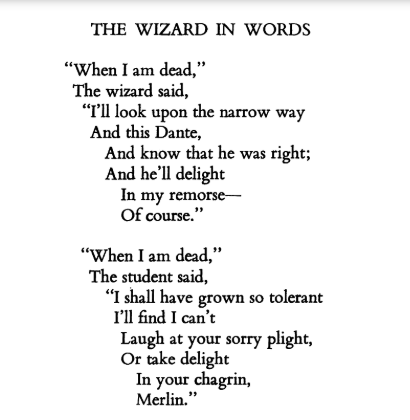It was the Gramarye of the Middle Ages, which some people are accustomed to think of as the Dark Ages, and Arthur had made it what it was. When the old King came to his throne it had been an England of armoured barons, and of famine, and of war. It had been the country of trial by ordeal with red-hot irons, of the Law of Englishry, and of the sad, wordless song of Morfa-Rhuddlan. Then, on the sea-coast, within a foreign vessel’s reach, not an animal, not a fruit tree, had been left. Then, in the fens and the vast forests, the last of the Saxons had defended themselves against the bitter rule of Uther the Conqueror; then the words “Norman” and “Baron” had been equivalent to the modern word of “Sahib”; then Llewellyn ap Griffith’s head, in its crown of ivy, had mouldered on the clustered spikes of the Tower; then you would have met the mendicants by the roadside, mutilated men who carried their right hands in their left, and the forest dogs would have trotted beside them, also mutilated by the removal of one toe—so that they could not hunt in the woodlands of the lord. When Arthur first came, the country people had been accustomed to bar themselves in their cottages every night as if for siege, and had prayed to God for peace during darkness, the goodman of the house repeating the prayers used at sea on the approach of storm and ending with the plea “the Lord bless us and help us,” to which all present had replied “Amen.” In the baron’s castle, in the early days, you would have found the poor men being disembowelled—and their living bowels burned before them—men being slit open to see if they had swallowed their gold, men gagged with notched iron bits, men hanging upside down with their heads in smoke, others in snake pits or with leather tourniquets round their heads, or crammed into stone-filled boxes which would break their bones. You have only to turn to the literature of the period, with its stories of the mythological families such as Plantagenets, Capets and so forth, to see how the land lay. Legendary kings like John had been accustomed to hang twenty-eight hostages before dinner; or, like Philip, had been defended by “sergeants-at-mace,” a kind of storm troopers who guarded their lord with maces; or, like Louis, had decapitated their enemies on scaffolds under the blood of which the children of the enemy had been forced to stand. This, at all events, is what Ingulf of Croyland used to tell us, until he was discovered to be a forgery. Then there had been Archbishops nicknamed “Skin-villain,” and churches used as forts—with trenches in the graveyards among the bones—and price-lists for fining murderers, and bodies of the excommunicated lying unburied, and famishing peasants eating grass or tree-bark or one another. (One of them ate forty-eight.) There had been roasting heretics on the one hand—forty-five Templars had been burned in one day—and the heads of captives being thrown into besieged castles from catapults on the other. Here a leader of the Jacquerie had been writhing in his chains, as he was crowned with a red-hot tripod. There a Pope had been complaining, as he was held to ransom, or another one had been wriggling as he was poisoned. Treasure had been cemented into castle walls, in the form of gold bars, and the builders had been executed afterwards. Children playing in the streets of Paris had frolicked with the dead body of a Constable, and others, with the women and old men, had starved outside the walls of beleaguered towns, yet inside the ring of the besiegers. Hus and Jerome, with the mitres of apostasy upon their heads, had flamed and fizzled at the stake. The hamstrung imbeciles of Jumièges had floated down the Seine. Giles de Retz had been found to have no less than a ton of children’s bones, calcined, in his castle, after having murdered them at the rate of twelve score a year for nine years. The Duke of Berry had lost a kingdom through the unpopularity which he earned by feeling sorry for eight hundred foot soldiers who had been killed in a battle. The youthful count of St. Pol had been taught the arts of war by being given twenty-four living prisoners to slaughter in various ways, for practice. Louis the Eleventh, another of the fictional kings, had kept obnoxious bishops in rather expensive cages. The Duke Robert had been surnamed “the Magnificent” by his nobles—but “the Devil” by his parishioners. And all the while, before Arthur came, the common people—of whom fourteen were eaten by wolves out of one town in a single week, of whom one third were to die in the Black Death, of whom the corpses had been packed in pits “like bacon,” for whom the refuges at evening had often been forests and marshes and caves, for whom, in seventy years, there had been known to be forty-eight of famine—these people had looked up at the feudal nobility who were termed the “lords of sky and earth,” and—themselves battered by bishops who, because they were not allowed to shed blood, went for them with iron clubs—had cried aloud that Christ and his saints were sleeping.
“Pourquoi,” the poor wretches had sung in their misery:
“Pourquoi nous laisser faire dommage?
Nous sommes hommes comme ils sont.“
From The Candle in the Wind by T.H. White.


